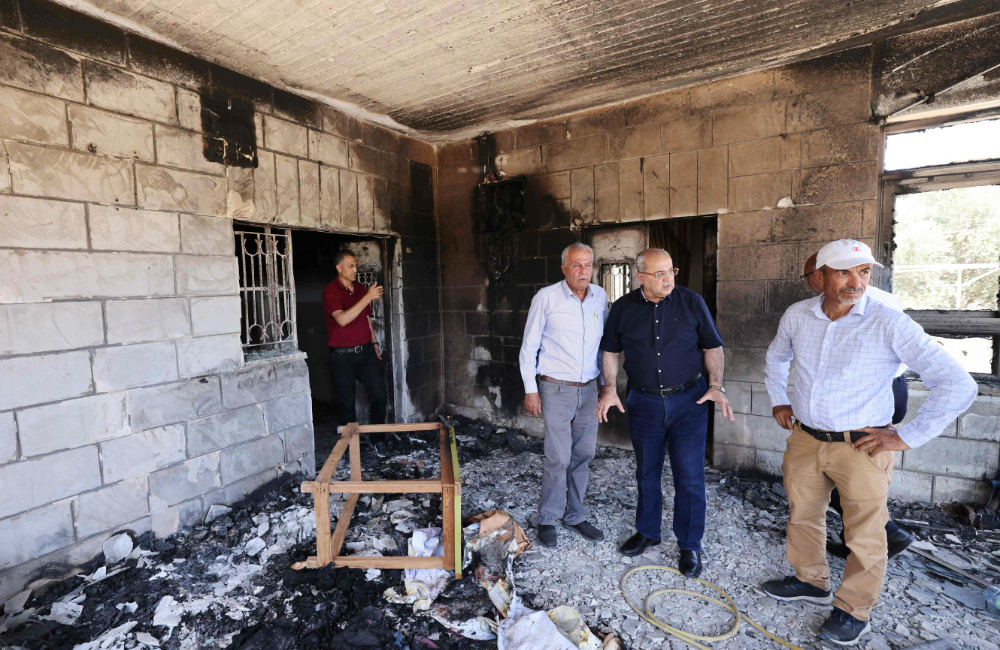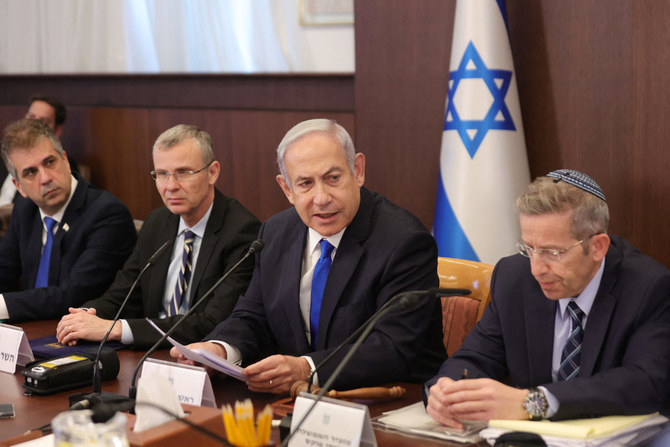RAMALLAH: All settler colonialism in the occupied Palestinian territories is illegitimate and illegal, Palestinian officials said on Monday.
Anger and frustration have been growing in response to Isreali Prime Minister Benjamin Netanyahu’s call to prevent the establishment of a Palestinian state
He reportedly told a closed-door meeting of the Knesset’s Foreign Affairs and Defense Committee that Israel must block Palestinians’ aspirations for an independent state and that “we are preparing for post-Palestinian President Mahmoud Abbas.”

Arab-Israeli Knesset member Ahmed Tibi (C-R) inspects the damage at the site of an attack by Israeli settlers on the village of Turmus Ayya near the occupied West Bank city of Ramallah on June 24, 2023. (AFP)
Nabil Abu Rudeineh, the official spokesperson for the Palestinian presidency, said that establishing an independent state with East Jerusalem as its capital was the only solution to achieve security and stability.
The Palestinian state existed, was recognized by more than 140 countries and only needed the end of the occupation to embody its independence, he said.
Netanyahu’s statements showed the world Israel’s true intentions, which reject international legitimacy and international law, and that no Israeli partner wanted to achieve peace based on international legitimacy, Rudeineh added.
BACKGROUND
Palestinians seek to establish an independent state in the West Bank and Gaza Strip with East Jerusalem as their capital.
The Palestinian Ministry of Foreign Affairs described Netanyahu’s statements as official recognition of the Israeli government’s hostile policy toward peace and rejection of the resolutions of international legitimacy and the implementation of the principle of the two-state solution.
The reported remarks provided new confirmation of the absence of a peace partner in the Israeli regime, it said.
The ministry pointed to the deliberate sabotage by Israel of all regional, international and US agreements, understandings and efforts to restore the political horizon for resolving the conflict.
It added that Netanyahu’s refusal to establish an independent Palestinian state was the political explanation for the violations of the occupation army, settler militia and terrorist elements and their crimes against Palestinian citizens, their land, properties, homes, crops and sanctities throughout the occupied territories, including East Jerusalem.
The ministry added that Netanyahu’s position encouraged “terrorist elements to commit more crimes of stealing Palestinian land, deepening settlements and planting more random outposts to undermine any opportunity to establish an independent Palestinian state.”
It called on the US administration to deal with Netanyahu’s anti-peace position “very seriously” and to take the necessary sanctions, pressures and measures to protect the opportunity to implement the two-state solution principle.
Nasser Al-Kidwa, a former representative of Palestine to the UN, told Arab News that the Israeli government did not want a settlement and would “lead the region to hell.”
“Neither Netanyahu nor the Israeli right nor any power in the universe can deny the Palestinians’ right to an independent state,” he said.
Palestinian political analyst Ghassan Al-Khatib told Arab News that, for the first time, Netanyahu’s words were consistent with his actions and observed behavior, as he had been closing the door to the establishment of a Palestinian state.
“Today he is emphasizing his extreme right-wing policy, which refuses to give up Israeli control over any part of the Palestinian territories,” he said.
Netanyahu’s position had created a “new reality” for Palestinians and the international community, Al-Khatib added.
“What is important is what will be the international community’s position on that.”
Hamas joined the condemnation of Netanyahu’s statement, reaffirming its stance that Israel’s occupation is based on genocide, ethnic cleansing and settler-colonialism.
“Such remarks require the Palestinian Authority and the Palestine Liberation Organization to reconsider their compromise track and fruitless negotiations with the Israeli occupation authorities and end all security collaboration,” it said.
All forms of normalization had encouraged the Israeli authorities to commit further atrocities, it added.
“We call on the international community, the United Nations and the Organization of Islamic Cooperation to condemn such positions, as they violate the most basic human rights and all relevant resolutions, and threaten peace and security in the region.”
Palestinian officials are also frustrated by Ron DeSantis, the Republican governor of Florida and US presidential candidate who said the West Bank “is not occupied lands but rather belongs to the Jews, according to the Torah.”
Al-Kidwa told Arab News that the governor’s position was “immoral, denying the inalienable rights of the Palestinian people and their national existence and violating a system of international laws that recognizes the right of the Palestinian people to an independent state, and encouraging extremist Israeli groups to deny the rights of the Palestinians.”
He described DeSantis as “an opportunistic person.”
Meanwhile, on the eve of Eid Al-Adha, Israel’s military authorities launched a campaign of arrests in the West Bank and incursions into the homes of prisoners and ex-prisoners in several towns and neighborhoods in Jerusalem.
Amjad Abu Asab, head of the Committee for the Families of Jerusalemite Prisoners, said Israeli security forces focused on the areas of Silwan, Al-Isawiya, Jabal Al-Mukaber, Al-Sawwana, Al-Tur, the Old City and Beit Hanina.
After searching and destroying homes and their contents, the military seized money and vehicles, he said.
Israeli security forces also handed a notification to the released prisoners after seizing their money worth hundreds of thousands of dollars.
It said: “The money that the prisoners receive from the Palestinian Authority is money that was obtained as a wage and reward for committing terrorist operations and encourages terrorism.”
Israeli authorities began a campaign to confiscate and seize the funds of Jerusalemite prisoners in 2020.































